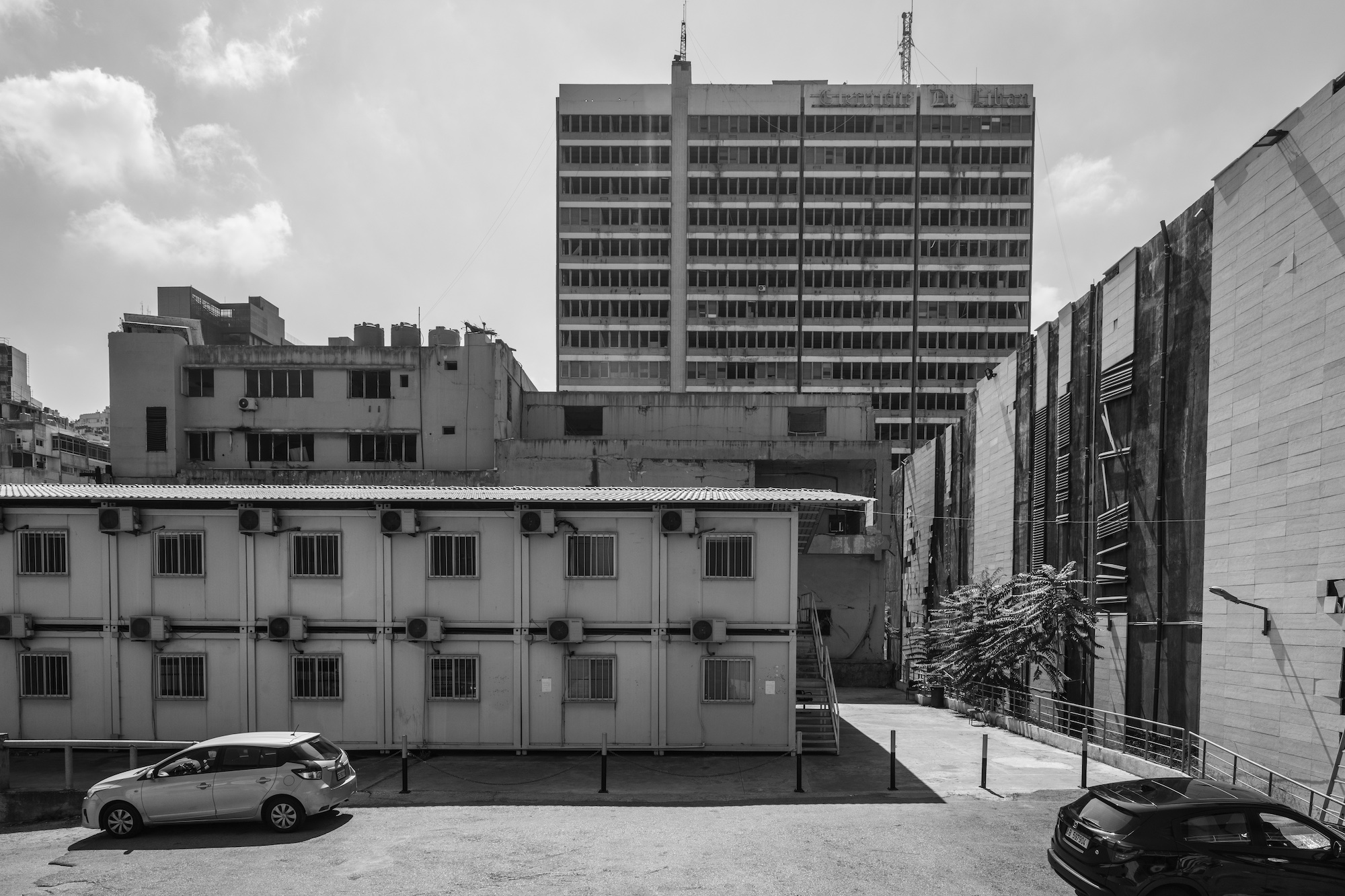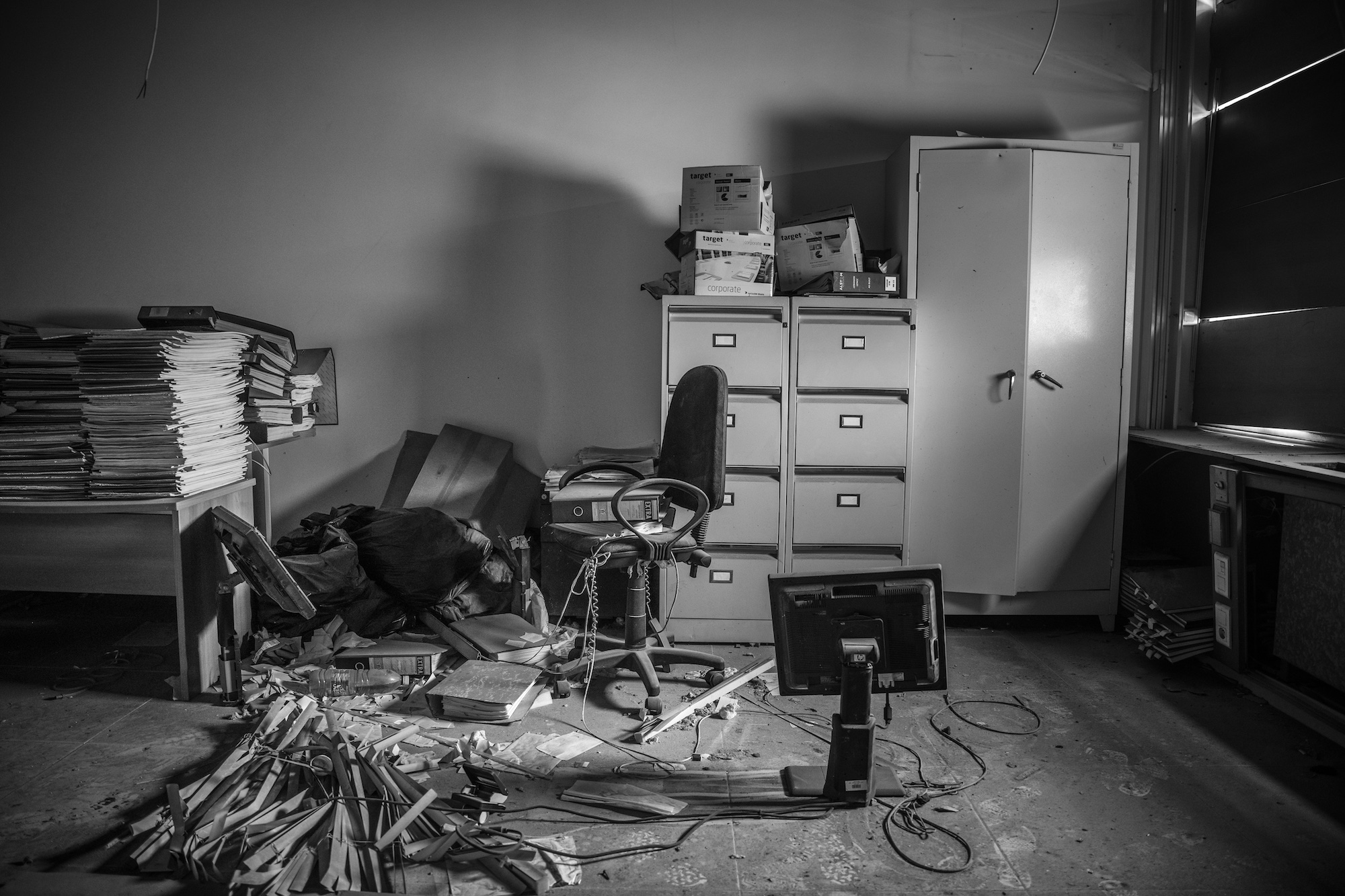For weeks we have been trying to get permission to visit the headquarters of Électricité du Liban. Hala is well connected with Walid Fayad, the Lebanese Minister for Energy, having called him a few days earlier. Fayad in turn spoke to Kamal Hayek, the managing director of ÉDL. ‘Everything should be fine…’ Nevertheless, we still don’t have permission. It’s Friday morning. We fly back on Monday. Nobody works at the weekend. The three of us drive to ÉDL. No, they cannot let us in. The man at the entrance to the site – because the explosion in the harbour destroyed the high-rise, almost everyone works in temporary containers – is friendly but resolute. Hala calls Fayad again and passes the phone. The man at the entrance refuses at first, but then accepts the call. ‘Qui, monsieur le docteur… qui… bien sûre…’ We are allowed to pass.
The interior of the building is completely devastated. Despite this, people are continuously moving about on the ground floor. A telephone is ringing somewhere. We take the elevator – one of the four is working again – and stop at the third floor. A young man works amidst the debris. His window overlooks the silo ruins at the port. A machine hums, printing something nonstop. “What are you doing?” “Printing electricity bills.”
The lift goes up to the 13th floor. From here, the full extent of the destruction in the harbour is revealed. ‘Will the building ever be repaired?’ ‘Maybe.’

The headquarters of the state-owned Lebanese electricity company, Électricité du Liban (EDL), is situated in the heart of the Mar Mikhaël district. This high-rise building, spanning 14 floors, stands directly behind the grain silos at the harbour. In 1965, the Beirut architecture firm CETA won the competition organized by ÉDL to design the headquarters. The electricity company wanted a building that would integrate with the urban context, create public green spaces, and establish a connection to the sea – a testament to the “Golden 60s” and the vision of a progressive, modern nation.
Large pilotis carry the building volume. They create space in the basement for a spacious customer centre with an adjoining piazza, which is connected to Armeniastraße by a staircase. From here, the employees also have access to the garden terrace. Sun protection elements shade the façade facing south, towards the city. Playfully arranged on the ground floor, they are repeated above it according to a fixed pattern.

Nadin Heinich: How do people pay their electricity bills now? In cash?
Ziad Younes: They pay in cash and in lira.
Nadin Heinich: Why don’t you issue the bills in dollars?
Ziad Younes: Because it’s not legally possible. Even if we were to bill in dollars, what would the exchange rate be?
Nadin Heinich: One to 100,000 …
Ziad Younes: Says who? There is no official exchange rate, instead there is one to 1,500, one to 15,000, we have the exchange rate of the Sayrafah platform, Sayrafah-Plus, Sayrafah-Minus, the Lollar. And there is the black market rate, which determines our everyday life, according to which we shop in the store. However, there is no official institution that sets the latter rate. The government, including Électricité du Liban (EDL) as a public institution, cannot use this rate. What are we supposed to use as a guide, some cell phone app that shows the black market exchange rate between the lira and the dollar?
Nadin Heinich: The Central Bank …
Ziad Younes: The Central Bank under its long-time chairman Riad Salameh has refused to recognize anything other than one to 1,500, then one to 15,000. They invented the Sayrafa platform. The Sayrafa rate, at which the central bank honors international credit and debit card payments, is slightly below the real rate. Put simply, this only serves to steal money from depositors at the central bank. To come back to the actual question: Yes, we are collecting the electricity fees in Lebanese lira. Hundreds, millions of lira.
Nadin Heinich: You need trucks to transport the money …
Ziad Younes: Yes, we try to take the money to the banks … who don’t want to accept it. They don’t have people who can count the money. And even if we take this money to the central bank, the EDL is not able to exchange Lebanese lira for US dollars. The EDL today is very rich in cash … in Lebanese liras.
Nadin Heinich: Why doesn’t the central bank exchange the lira for dollars?
Ziad Younes: Because there is no market for it. The central bank also claims that it is not obliged to exchange. The EDL cannot buy fuel with the money it receives. That is one of the reasons why the company only supplies electricity for a few hours a day.
Nadin Heinich: Why can’t EDL buy fuel with cash?
Ziad Younes: Because they have cash in lira. But the fuel is paid for in dollars. Do you think Kuwait Energy sells for lira?
Nadin Heinich: How do you get paid?
Ziad Younes: We don’t get paid. Only very, very little. That’s why we have to limit our work to the bare essentials, cross-finance it with other projects and hope that one day we will be paid. Everyone has a cross to bear. This is mine. It’s a very heavy cross.
Nadin Heinich: Why don’t you get paid from the electricity charges you collect? EDL is just storing this money.
Ziad Younes: That’s against the law. The electricity charges are public money. We have been entrusted with collecting and paying them.
Nadin Heinich: Is Électricité du Liban a mirror for the situation in the country, for its absurdity?
Ziad Younes: EDL is a symptom of the country’s political system. A very inefficient system. In game theory, one would speak of the “prisoner’s dilemma” – in simple terms, a situation in which two rationally acting individuals, although they could both achieve a common benefit by working together, instead pursue their own interests. This leads to a worse outcome for both. But nobody changes anything.
Nadin Heinich: What is the way out?
Ziad Younes: To create a system in which decision-making is possible. For this we would need a secular state with centralized executive power, which would of course have to change from time to time. Today, no one has the power to make decisions. We have several centers of power that cancel each other out.
About:
Ziad Younes is the CEO of BUTEC, which stands for ‘Bureau Technique d’Etudes et de Construction’ or Engineering and Construction Office. The construction company was founded in Beirut in 1964 and is now one of the leading players in the Middle East, the Gulf States and North Africa. Younes is a founding member of the Massachusetts Institute of Technology Enterprise Forum for the Pan Arab Region, regularly gives lectures and publishes in leading academic journals. He is a graduate of Ecole Polytechnique in France and holds a Master of Science in Technology and Policy from MIT and a DEA (Diplôme d’études approfondies) in Industrial Organisation from the University Paris IX-Dauphine.
BUTEC is one of the companies responsible for maintaining the Lebanese power grid. www.butec.com